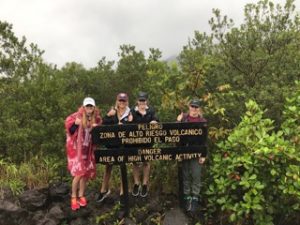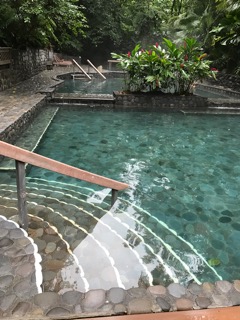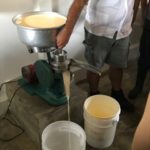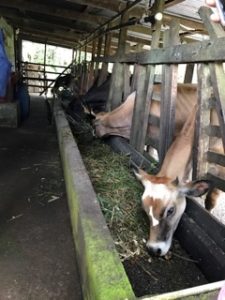Collectivism can be briefly defined as an “emphasis on collective rather than individual action or identity,” whereby the group’s success ensures the individual’s well-being. In Costa Rica, collectivism can be seen in different forms throughout the country. For example, land surrounding Volcano Arenal has been preserved since the volcano’s last eruption in 1968. This conservation effort represents collectivism because it benefits the greater good of society through protection of a natural resource for future generations.

If you didn’t take a picture with the volcanic activity sign, did you really hike the Arenal Volcano?
After visiting the town of La Fortuna, our group took a hike on Volcano Arenal. The extent of conservation with the idea of collectivism in mind was obvious. The main idea was to protect the volcano and surrounding rainforest, while reminding visitors of the area’s historical significance. After erupting and completely burying the city in 1968, the volcano continued to produce small eruptions until 2010, before going into a resting phase. The volcano has become a significant attraction to Costa Rica.
In addition to hiking the volcano, tourists may also visit other attractions at its base. There are several hotels, the famous Eco-Termales Hot Springs, ATV and horseback rides, waterfall tours, and the beautifully simplistic rainforest open for those wanting to explore more nature.
Collectivism can be observed because the benefits of the volcano and surrounding activities are not exclusive to one individual. Rather, they benefit the well-being of surrounding communities and Costa Rica by generating income, while keeping the history of this magnificent beast alive.
Another example of collectivism was seen at the Chrisley farm. The owner, Mr. Chrisley, may have an individualistic mindset, but his occupation in the dairy industry enhances his collectivistic practices by allowing him to support something larger than himself. Mr. Chrisley and his family raise dairy cattle, using the milk to produce their own one-of-a-kind cheese blend, the most common being mozzarella.
Just as in the United States, farming and ranching in Costa Rica takes time and dedication. The Chrisley family may be one of the more affluent families because they inherited their land from previous generations, However, they welcome others to share in their affluence.
While it can be argued that Mr. Chrisley is an individualist, he practices a collectivistic occupation. Mr. Chrisley said that he could easily ask higher prices for his cheese and keep all the profits, but he wants to help his community and other families. He has opted to be the middle-man for five other families who buy his cheese, then resell it for higher prices.
Collectivism can be a controversial topic because it is viewed in different ways. From my time in Costa Rica, I have a new-found understanding of collectivism and how it compares to individualism. I challenge everyone who reads this blog to take a look beyond their personal desires, and find a way to improve society. Costa Rica has definitely opened my eyes to the many ways, both large and small, that I can be a part of something bigger than myself.


